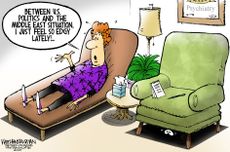What's not to like about 'like'?
I like 'like'!


When President Trump tweeted about "being, like, really smart," many people took the "like" as evidence to the contrary. It's, like, a meaningless word that brainless people stuff into sentences! A fad among the younglings! As noted grammarian Robert Burchfield wrote, "Its use as an incoherent and prevalent filler" has become "an epidemic," but it is "scorned by standard speakers as a vulgarism of the first order."
Burchfield dated the start of the "like" epidemic to the middle of the 20th century. But we do like "like" sometimes. It may be weak tea compared to "love," but every YouTuber is gunning for "likes," and most people want to be liked (like Sally Field). That's the verb like, which is not quite the same like, but they are related, way back. And even if we like to hate like, we like it so much that we keep coming up with new uses for it … nearly all of which someone hates for some reason.
Quite a few academic papers have been published on the different uses of like. Alexandra D'Arcy, a professor of linguistics at the University of Victoria, has published a whole book just on the four different types of the "filler" kind of like.
Subscribe to The Week
Escape your echo chamber. Get the facts behind the news, plus analysis from multiple perspectives.

Sign up for The Week's Free Newsletters
From our morning news briefing to a weekly Good News Newsletter, get the best of The Week delivered directly to your inbox.
From our morning news briefing to a weekly Good News Newsletter, get the best of The Week delivered directly to your inbox.
Four types? Yes, not all those filler likes are alike. And there are, like, several more kinds of like as well. Here are 12 likes for you to like — or dislike.
1. "Say it like you mean it." Say it as though you mean it, surely? But people have been saying like this way — and meaning it — since at least the year 1400. Authors of grammar guides have opposed this use of like in modern days, but good authors have assiduously ignored them. In 1932, for instance, T.S. Eliot wrote: "When you're alone in the middle of the bed and you wake like someone hit you on the head."
That someone was probably a grammar grumbler. Oh, wait, it's only like they hit you.
2. "Run like mad." Run like someone who is mad? The issue with this like, which we've also been using since the 1400s, is not that another word would be better, but rather that some words seem to be missing. It also has a bad rap because of what this like is like — people do things like mad, like crazy, like nuts, but never like sane, like rational, like calm.
3. "If you knew Susie like I know Susie … " Why not "If you knew Susie as I know Susie?" William Strunk Jr. and E.B. White, in their 1959 grammar tract The Elements of Style, suggested that the use of like in place of as was a mere passing vogue among the intelligent: "Like has long been widely misused by the illiterate; lately it has been taken up by the knowing and the well-informed, who find it catchy, or liberating, and who use it as though they were slumming." That would apparently include illiterates like Charles Darwin, who used it in a letter in 1866: "Unfortunately few have observed like you have done." Or like William Caxton, who used it in 1489 when he wrote, "That went up and down like a balance doth." He was the guy who brought the printing press to England.
The vogue hasn't passed, either, though like is still not as high-toned as as. But while you may use as in place of like and sound more refined, you won't always be clearer. If I say "Do it as I do it," you'll have to ask "Do it when you do it or do it like you do it?" I could say "Do it in the manner in which I do it," but that's, like, a lot of words.
4. "Like I was saying, it's fine." This like is like the last like — and has about as much of a class basis to it. The right sort of people are supposed to say, "As I was saying"; if you use like you are … not the right sort of people. The "correct" version has the same weakness as well: "As I was telling you, he arrived" could mean that he arrived during the telling. You could argue that "Like I was telling you, he arrived" may mean that he arrived in the same manner as I was telling you, but (a) that is also a weakness of "as" and (b) like anyone's going to think you meant that. Right.
Grammar nitpickers insist that like can't be a conjunction, even though it has obviously been used as one for 600 years. Even the crusty Mr. Burchfield allows the conjunction use of like some corner of legitimacy. "It would appear that in many kinds of written and spoken English like as a conjunction is struggling towards acceptable standard or neutral ground. It is not there yet. But the distributional patterns suggest that the long-standing resistance to this omnipresent little word is beginning to crumble."
5. "I want to love somebody like you." To be clear: not you, just someone like you. This turn of phrase may well exist solely so people can get their kicks nitpicking. It's been around at least since the 1600s. It's true that we could rephrase "somebody like you" as "somebody such as you," or even "such a one as you," but not everyone likes the sound of that.
Besides, sometimes we want that ambiguity. "A critic like you is one who fights the good fight, contending with stupidity," Robert Louis Stevenson wrote in 1877, and left it unsaid whether the critic he was addressing was also fighting the good fight, or whether it was just one like him.
6. "What's it like?" Here's another one that's been around at least since the time of Shakespeare. In All's Well That Ends Well, the Bard wrote: "What was he like? I have forgot him." Only the pickiest of pickers — those who dislike like everywhere its like appears — can pick at this, but some people will insist that unless you're inviting a literal comparison, you should say "How is it?" They'd also prefer for Shakespeare to have written "What kind of a man was he?" or "Describe him."
7. "She like to bust a gut laughing." Now we move into the realm of very informal (or anyway nonstandard) speech. In the 1400s people were saying things like "I was like to have been killed" to mean it nearly happened; by the time of Shakespeare, the was could be left off: "I have had four quarrels, and like to have fought one." (That's from As You Like It.) You may associate this turn of phrase with a more rural American milieu, for instance Mark Twain's The Adventures of Huckleberry Finn, where we read "We like-to got a hornet's nest, but we didn't."
8. "Are you her flatmates, like?" This like is unfamiliar to American English speakers, though anyone who has watched a movie like Trainspotting may recognize it. It loosely translates to "or something like that," and it's been around since before 1778, when Fanny Burney used it in her novel Evelina: "Father grew quite uneasy, like, for fear of his Lordship's taking offence." It may be the mother of other slangy likes.
9. "You have to add like some peanuts or almonds." This is the first of the four types of "filler" likes that Alexandra D'Arcy has sorted out. It's rather like the previous like, only in this case the word comes before what it modifies, right in the middle of the sentence, rather than stuck at the end. If you make it "something like" or "something such as" instead, you'll please even the grumbliest of grammar scolds.
10. "It's like a hundred degrees out there." If you dislike this usage, I have bad news for you: D'Arcy looked at the data and found that like is increasingly being used to replace about in these contexts. Older people are still using about, but the younger ones prefer like, and they keep liking it even as they get older. Many people are fine with using it to mean, "It's not a hundred degrees but it's very similar to it," but they object to, "It's, like, a hundred degrees out there" — which is really the next type of like.
11. "Like, I don't know if you know, but he, like, hates it." This is the classic interjected like, the one that Burchfield and so many others hate so much. It comes from the Valley Girls of the 1980s. No, wait! It comes from the hippies of the '60s! No, wait! It comes from the jazz hepcats of the '40s and '50s! In reality, none of these groups are to blame for the scourge of the interjected like — although they all did help spread it.
The true culprits, D'Arcy found, are speakers over 65 and even into their 70s and 80s, especially in rural England. This like and the previous two are surprisingly current among that population. Not only that, but D'Arcy also discovered that these likes were being used by elderly speakers from New Zealand who were born as far back as the 1850s to parents mostly from the U.K.
This like may come from the same like as number 8, but it moved to the beginning of the phrase and broadened in sense. It's a discourse particle — which means it's in the same general set as y'know and by the way and of course. It's a linguistic setup, like a backswing.
12. "So I'm like, 'You gotta be kidding.'" This may be the most hated like, probably because of its association with young women. By the way, have a look at how many speech habits people hate that are typically associated with young women: "vocal fry," "uptalk," "I literally … " Like those tics, this one is actually used by all sorts of people: D'Arcy found that women do use this like more, but only about 20 percent more often than men. The other likes are used about equally regardless of gender.
This like is a very recent addition. The earliest use of "I'm like" or "I was like" to mean "I said or thought something like" dates to the early 1980s. However, uses of said like, thought like, and goes like to introduce quoted speech were already current in the 1970s. Now, the use of go by itself to mean "say" ("So I go, 'I don't think so'") goes back to the mid-1800s, following the use of go to indicate "to make a noise," as in "The gun went bang." That's been around since the 1500s. Bring in the approximating like and it's pretty easy steps from "She goes, 'No, I don't want to'" to "She goes like, 'No, I don't want to'" to "She's like, 'No, I don't want to.'"
All of these likes are being used more and more — sorry not sorry, Strunk and White and Burchfield. And don't be surprised if even more versions of like show up. Haters may hate it because it's imprecise, because it's used too widely, because it's, like, semantically promiscuous; they may hate it because they think it's a thing annoying young women do, in which case they should ask themselves what they have against young women.
But while it may not be taking over formal speech yet, it's not going away. So when people take strong dislikes to these likes, I say to them, "Don't be like that." (Which, by the way, people have been saying for more than 150 years.)
Create an account with the same email registered to your subscription to unlock access.
Sign up for Today's Best Articles in your inbox
A free daily email with the biggest news stories of the day – and the best features from TheWeek.com
James Harbeck is a professional word taster and sentence sommelier (an editor trained in linguistics). He is the author of the blog Sesquiotica and the book Songs of Love and Grammar.
-
 'A direct, protracted war with Israel is not something Iran is equipped to fight'
'A direct, protracted war with Israel is not something Iran is equipped to fight'Instant Opinion Opinion, comment and editorials of the day
By Harold Maass, The Week US Published
-
 Today's political cartoons - April 17, 2024
Today's political cartoons - April 17, 2024Cartoons Wednesday's cartoons - political anxiety, jury sorting hat, and more
By The Week US Published
-
 Arid Gulf states hit with year's worth of rain
Arid Gulf states hit with year's worth of rainSpeed Read The historic flooding in Dubai is tied to climate change
By Peter Weber, The Week US Published
-
 Walter Isaacson's 'Elon Musk' can 'scarcely contain its subject'
Walter Isaacson's 'Elon Musk' can 'scarcely contain its subject'The latest biography on the elusive tech mogul is causing a stir among critics
By Theara Coleman Published
-
 Welcome to the new TheWeek.com!
Welcome to the new TheWeek.com!The Explainer Please allow us to reintroduce ourselves
By Jeva Lange Published
-
 The Oscars finale was a heartless disaster
The Oscars finale was a heartless disasterThe Explainer A calculated attempt at emotional manipulation goes very wrong
By Jeva Lange Last updated
-
 Most awkward awards show ever?
Most awkward awards show ever?The Explainer The best, worst, and most shocking moments from a chaotic Golden Globes
By Brendan Morrow Published
-
 The possible silver lining to the Warner Bros. deal
The possible silver lining to the Warner Bros. dealThe Explainer Could what's terrible for theaters be good for creators?
By Jeva Lange Last updated
-
 Jeffrey Wright is the new 'narrator voice'
Jeffrey Wright is the new 'narrator voice'The Explainer Move over, Sam Elliott and Morgan Freeman
By Jeva Lange Published
-
 This week's literary events are the biggest award shows of 2020
This week's literary events are the biggest award shows of 2020feature So long, Oscar. Hello, Booker.
By Jeva Lange Published
-
 What She Dies Tomorrow can teach us about our unshakable obsession with mortality
What She Dies Tomorrow can teach us about our unshakable obsession with mortalityThe Explainer This film isn't about the pandemic. But it can help viewers confront their fears about death.
By Jeva Lange Published